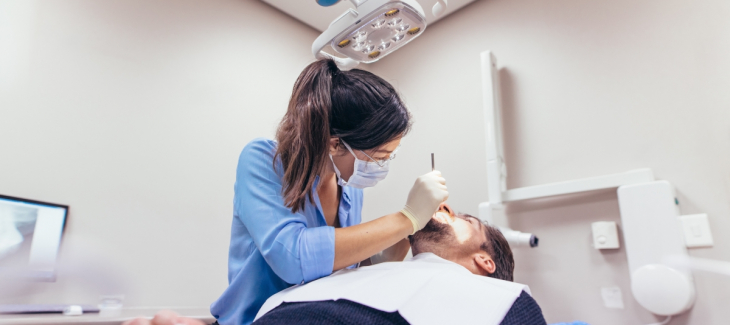- General
- Telehealth
- Dentist
- Career Trends
- Featured
- Legal
- Dentist Industry
- News and Events
- Technology
- How To
- Procedures
- Training
- Employer News
- Candidate News
Recent Posts
Most Popular
Residency vs. Job

D4‘s face a difficult decision upon graduation: do I pursue a residency or go straight to work? I have asked my colleague, Maria, to weigh the benefits and drawbacks of each post-grad option. Maria has the unique perspective of completing a residency-like clerkship during her senior year (Diamond Scholars). Having recently graduated, she now works as an associate dentist. I have always admired Maria’s boundless energy and positivity…this mindset allows her to tackle it all! Hopefully, her interview will help you decide which post-grad option is best for you!
1. What are the benefits and drawbacks of doing a residency?
Specializing: Let’s start with the simplest route. If you want to specialize, you have to do a residency. Because this can be 2-6 years of extra training, most people start a program immediately following dental school. However, for more competitive fields like endo or OMFS, you are viewed as a more competitive candidate if you have some general dentistry experience, whether that be from an AEGD, GPR, or private practice. Some people don’t decide to specialize until they do a general dentistry residency, and of course, you don’t have to be a specialist to do a specialty procedure in your career!
General Dentistry: Now, for the more complicated route. Residency offers you a dedicated year of learning, but you take a pay cut. For example, a resident’s salary is $60k while a new dentist’s salary can be $120k with potential for bonuses (i.e., if you produce more, you earn more). However, this pay cut may be worth it for convenience. At UMSOD, we were assigned rotational blocks every six weeks, and sometimes, it felt like a huge interruption. You weren’t allowed to see your own patients, but you were still responsible for their scheduling and emergencies. Imagine having to find your own hands-on CE courses while managing an entire practice! You’d be paying for the CE and travel, closing your practice, continuing to pay rent…all of which can be very expensive and hurt your practice reputation. Wouldn’t it be better to have a yearlong block of “CE” to ensure less interruption for the rest of your career?
During and immediately after dental school, our learning is exponential. We started out knowing nothing, to deciding when it was necessary to drill a tooth. Even if you earned A’s in clinical requirements, 18 crowns or 5 dentures aren’t much in terms of production. In residency, you practice by sheer volume without worrying about making ends meet. You will hone your skills, learn new techniques, and put them to use. You will also learn how to handle your mistakes, explaining them to the patient and rectifying the tooth without jeopardizing your license. It’s like a gap year for dentists.
The unspoken perk of residency is networking. It’s a learning experience with students from other schools and faculties of different backgrounds; some attendings may even be looking to hire an associate. Plus, you meet vendors before they transform to salesmen at your practice. I know one rep that visited our school on implant placement days to walk the residents through all the steps and materials. At a school like Maryland with a strict vendor policy, it’s nice to have some exposure in a semi-academic setting.
The last benefit of doing a residency is that some states might require it for licensure. For me, if I wanted to return home and practice in Delaware, I needed to do a GPR among other requirements. You never know where you may end up. So why not play it safe and be qualified anyways?
A drawback of doing a residency is that, unless you pick a program where you plan to settle down, you will probably be burdened with moving to and from your residency location. Some people may be young and flexible, but others may have factors to consider like their spouse’s career or children’s schooling.
2. What are the benefits and drawbacks of going straight to a job?
You are finally a dentist! This is the moment we’ve all been working so hard for. But, “with great power, there must also come great responsibility.”
Sure, you don’t need anyone to confirm your treatment plan or check your prep. But what if you want someone to? Or, what if you’re stuck and you can’t find the MB2 or pick out that last root tip? Heaven forbid, what if the patient swallows a crown or seizes in the chair? It’s your license and reputation. Hopefully, you found a good gig where there’s an experienced dentist willing to mentor you. A mentor can teach you not only dentistry, but transition you into the practice and teach you how to best serve their patients, which is beneficial if you plan on becoming a partner or owner.
It’s almost like creating your own residency program. You have control over what you learn, whether that’s dentistry, practice management, wellness, or more. Unlike residency, you don’t have to share your mentor’s attention with co-residents. This can help you quickly achieve your personal goals. For example, I wanted to gain experience with peds, root canals, and implants. The programs I interviewed focused on comprehensive patient care so it wasn’t guaranteed that I’d graduate with those skills. Conversely, the dentists I met were flexible and able to prioritize my schedule with those procedures.
Finding the right job is a combination of the contract’s fine print and vibe with the mentor. If you don’t like your job, you can always quit, but it might be tougher to stay in your region due to restrictive covenants. If you quit, this limits where you can work next (e.g., “no practice within a 10-mile radius for the next 3 years”), and that can be very detrimental if you’re in a city. Some colleagues work part-time in multiple practices. After a double learning curve, it’s double the experience with different mentors and different offices. This opens up more opportunity for ownership without the pressure of starting from scratch.
Overall, working a job is what you make of it, and you can certainly expect to be paid well and start tackling student debt. Because of the salary and individualized mentorship, I don’t personally know of any dentist who worked then later sought a general dentistry residency (although it does happen).
3. How can a D4 decide which is best for him/herself?
Unless you have a practice to inherit, I highly recommend completing a residency. Inheriting a practice can stem from having a parent who’s a dentist or a long-term relationship with a mentor. I have classmates who have been shadowing one practice since high school or college, and the owners are ready for them to take charge. Meeting an owner once or twice isn’t enough—you need to know that they have your best interest at heart. For these people, residency isn’t necessary but it still provides value and can be fun. Work is serious, and it’ll always be there for the rest of your life. Residency offers you time to develop your skills and learn about the type of dentist you want to become before having to carry yourself.
Beware, programs vary a lot. It’s hard to find information online, so word-of-mouth and shadowing have been incredibly helpful throughout the process. While I’m a firm believer that you can always learn something from every experience, you definitely do not want to be searching for silver linings in a curriculum that doesn’t challenge you or suit your interests.
Below are two common questions that I can offer some thoughts on:
- Does completing a residency make it easier to get a job? I think it has potential for connections, but you still have to go through the application process. Though rare, I know of some practices that look down upon those who did a residency because it meant the dentist wasn’t confident (in my opinion, haters gonna hate). I didn’t do a residency, and when I got rejected from jobs, it was because I didn’t have any private practice experience. Someone who completed a residency is in the same boat as me, and will still be applying for the same positions as me, with zero years of experience.
- Does completing a residency get you a better salary? I’ve been offered the same contract as those who did a residency. Perhaps they earn more bonuses because they’re faster or able to complete more advanced procedures. However, I do know some people who did a residency and are now only doing the “basics” because they no longer have the fallback that a residency provides.
4. How can a D4 tell if he/she is ready for a job?
Nobody is ever completely ready. If you’re still hesitant about a lot of dental procedures, then some extra practice in a residency could be good because the actual dentistry is the least of your concerns at a job. You don’t have to be the most confident dentist ever, but if you are aware of what lies ahead and have initiative to give yourself direction, I believe you’ll be fine.
[NOTE: I will chime in here! I’ve decided to pursue private practice directly out of school. I doubt I’d feel any more “ready” after completing a residency. I’ve accepted that I will inevitably face scenarios that I haven’t prepared for. But, I will trust in my training. I may not be perfect, but I’m confident that I will approach every curve ball with professionalism and compassion. When you are ready to begin searching for a job, in addition to word-of-mouth and school-sponsored job/vendor fairs, try online dental job forums like DentistJobCafe.]
5. Any other tips for D4’s as they look towards the future?
Don’t just look at it like residency versus job. Apply to both and figure out the best opportunity for you. And don’t let money be the determining factor! Everybody has loans, and everybody pays them back eventually.
Feel free to message me as well (@doctor.oei)! I feel like I’ve been through it all. At UMSOD, I was lucky to be chosen for the Diamond Scholars Program, which gave me AEGD experience. To start my career, I was location driven, hoping to end up in the Delaware/Philly region. I applied to a select few GPRs but didn’t match (I’m not ashamed to be rejected and you can ask me why). I applied in post-match for other AEGD or GPR positions but didn’t find a good fit. I applied to jobs—DSO and private practice—and now I couldn’t be more excited to start learning from my mentor this month! I spent a lot of time reflecting and thinking about the type of dentist I want to be and the life I want to live. I grew a lot this past year, and reluctantly, I realize that it’s finally time for me to get out of school and be a real adult.
Dental school is hard because we want that degree so badly. Once you obtain it, breathe easy and remember that dentistry is only your profession. You have your life to enjoy now!
How did you decide between a residency and job? Comment below!
Click HERE for the original post!







Comments